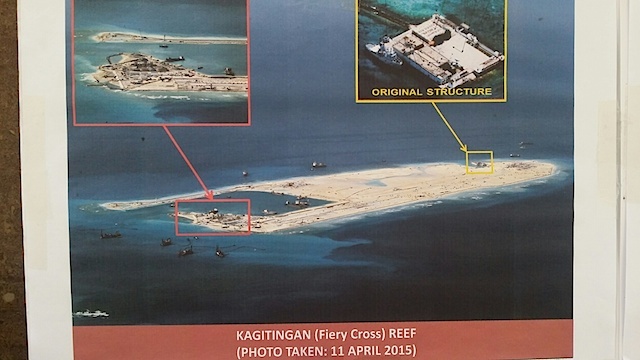Former ABC News Beijing bureau chief Chito Sta Romana tells Rappler China is 'caught in a bind' after the US strongly responded to its reclamation activities

'CHINA'S FURIOUS.' Former ABC News Beijing bureau chief Chito Sta Romana says China was furious that the US strongly criticized its artificial island-building in the South China Sea
China's massive reclamation in the South China Sea was meant to undermine the Philippines' historic legal case but Beijing “miscalculated” the strong reaction of the United States.
Former ABC News Beijing bureau chief Chito Sta Romana said that China's artificial island-building elevated the dispute from an issue between Manila and Beijing to one between Washington and Beijing.
In an interview on Rappler Talk, Sta Romana said that China was “furious” that the Philippines got its treaty ally and former colonizer to weigh in.
“The problem now is that the Chinese were basically expecting the Philippine counteraction, which is diplomatic protest, to go to ASEAN. They didn't expect the US would react in this way. So the Chinese, I think, have certainly made tactical, and possibly, a strategic miscalculation,” said Sta Romana, who lived in China for more than 3 decades.
Watch the full interview here:
Over the past 18 months, China built some 2,000 acres worth of territory on submerged reefs and rocks in the disputed South China Sea, the equivalent of about 1,500 football fields. The so-called "Great Wall of Sand" drew criticism from the US, with President Barack Obama urging China to stop “throwing elbows and pushing people out of the way.”
In the Shangri-La Dialogue security summit in Singapore in late May, US Defense Secretary Ashton Carter criticized Beijing's maritime claims on the artificial islands. He said, “The United States will fly, sail and operate wherever international law allows.”
Sta Romana said that the question now is how China will respond.
“I think they are basically caught in a bind. I think they will continue with their reclamation but because the Americans have made a big fuss about militarization, it may moderate. Because if the Chinese were to introduce anti-ship missiles or anti-air missiles, this would be a bigger story, a bigger case,” he said.
The president of the Philippine Association for Chinese Studies said that China's reclamation was merely meant to preempt the outcome of the Philippines' arbitration case, with a ruling expected in early 2016. (READ: 'PH case provoked China's massive reclamation in West PH Sea')
Sta Romana pointed out that China built artificial islands on 7 maritime features that are the subject of Manila's case under the UN Convention on the Law of the Sea. China rejects the case, and refuses to participate. The problem is the arbitral tribunal has no enforcement mechanism. (READ: Rough seas: Will PH 'lawfare' work vs China?)
“The Chinese have built artificial islands to say that even if the arbitration tribunal resolves this in our favor, 'Here we are. Come and get us if you can.' So it is a challenge,” Sta Romana said.
“Their objective was just to undermine the case filed by the Philippines, and to scare in a sense the Philippines and Southeast Asia, but they have now touched on a nerve, a strategic nerve that affected the US,” he added.
Vietnam, Malaysia, Brunei and Taiwan also have claims over the strategic sea, one of the world's busiest shipping routes, a key fishing site, and an area believed to hold vast deposits of oil and gas. China claims “indisputable sovereignty” over almost the entire South China Sea.
Sta Romana said that China initially reclaimed land in secret but only explained to the international community when satellite images exposed the extent of its construction work.
“This is the effect. You can call it the Rappler effect, the CNN effect or the BBC effect. When something is put under the glare of television, it mobilizes international public opinion. And the Chinese have not encountered this. So this is what they're trying to react against.”

Photo of China's reclamation in Fiery Cross Reef. Courtesy: Armed Forces of the Philippines
Avoid repeat of 2001 collision
With the escalating word war and tensions between the US and China, Sta Romana said that the two superpowers must avoid an accident similar to what happened in 2001.
Back then, a Chinese F-8 fighter collided with a US Navy EP-3 reconnaissance plane over the South China Sea.
“Because can you imagine a sophisticated Chinese jet falling into the ocean? Or a Poseidon falling into the ocean? All bets are off. This is what is to be avoided: an accident that could turn into a major incident that could turn into a possible conflagration.” “The Chinese jet and its pilot crashed into the sea, and the American plane had to crash-land into Hainan, and the American crew was detained for more than 10 days. This provoked a diplomatic and political crisis so you could have a repeat of that and probably worse,” Sta Romana said.
Still, Sta Romana said it is to the interest of both the US and China to avoid a direct confrontation.
“The Chinese for sure don't want a war with the US now because they could lose, and the century of humiliation they are talking about that they want to overcome could be repeated. So that's the least they want but we cannot preclude a short, sharp conflict if there is a miscalculation.”
In a separate interview with Rappler, Ernest Bower of the Washington-based Center for Strategic and International Studies (CSIS) also said that there is “relatively high danger” of a flashpoint confrontation in the South China Sea.
“Washington and Beijing are assessing each others’ tolerance for risk. The Americans have to be careful not to fall into the trap where the Chinese will push ahead and say, 'If you respond to us militarily, you're the aggressor. Americans, you came in here. You provoked us.'”

'HALT LAND RECLAMATION.' US Defense Secretary Ashton Carter looks on during the keynote on the first day of the International Institute for Strategic Studies (IISS) 14th Asia Security Summit in Singapore, 29 May 2015. Photo by Wallace Woon/EPA
Not a choice between US or China
Beyond freedom of navigation, Sta Romana said that the US responded strongly to China's land reclamation because it challenged Washington's Asia pivot or rebalance policy, and its position as the “dominant power” in the Asia Pacific since World War II and the end of the Cold War.
He said that by building an airstrip and military installations on artificial islands, China will be in a position to exercise de facto control over the South China Sea.
“If you look at what the Chinese is doing, the rise of Chinese power, particularly its naval and military power, it's shifting the balance of power. So these are the opening salvos of what we are seeing as a historic transition, a rising power that is China, challenging an established power that is the US.”
Sta Romana stressed that claimant countries like the Philippines should not view the dispute as a choice between American or Chinese hegemony.
Critics of Philippine foreign policy accuse Manila of “excessive pro-Americanism” at the expense of the country's diplomatic ties with China.
“You can actually have another alternative. For the US not to be the superpower but to become a major power, and for the Chinese, from a regional power becomes a major power but you have Russia, Japan, India, ASEAN centrality. You can have a concert of powers,” Sta Romana said.
“But the Americans are certainly not going to give up so easily.”

